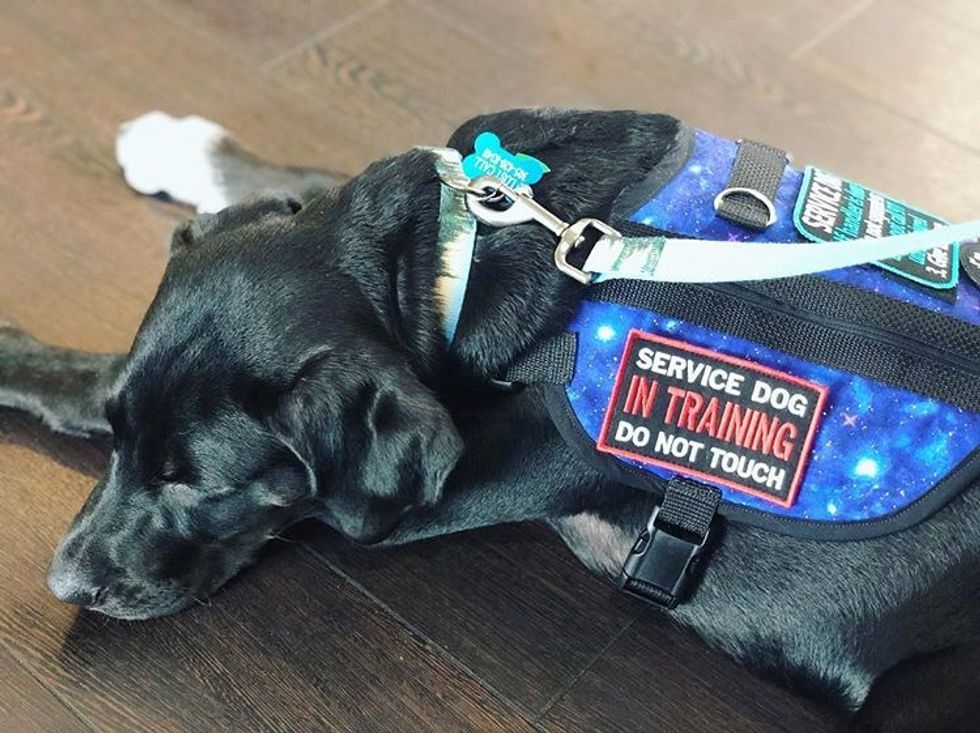I want to start by saying that in no way am I mitigating or eliminating the use or value of emotional support animals (ESA). Having one myself, they provide an invaluable service to those who rely on them.
However, they are not service animals. There is a distinct and legal difference between what a service animal is and does and an emotional support animal.
Let's talk about legal definitions. These definitions can on the American Disability Act's (ADA) website.
"A service animal means any dog that is individually trained to do work or perform tasks for the benefit of an individual with a disability, including a physical, sensory, psychiatric, intellectual, or other mental disability."
"While Emotional Support Animals or Comfort Animals are often used as part of a medical treatment plan as therapy animals, they are not considered service animals under the ADA. These support animals provide companionship, relieve loneliness, and sometimes help with depression, anxiety, and certain phobias, but do not have special training to perform tasks that assist people with disabilities."
The difference between a service animal and an ESA is like the difference between Taylor Swift and you singing in the shower. Taylor Swift is a trained, professional artist. It is her job to sing. That is the work that she has practiced long and hard to get good at.
Let's go into detail on some more difference.
A Service Animal must be a dog or a miniature horse

According to the ADA, only service dogs are covered by the act, but reasonable accommodations must be made for trained miniature horses as well. This means your cat, lizard, guinea pig, and T-Rex are not covered.
A Service Animal is specifically trained to perform its task

There are a few different types of service animals (we'll stick to calling them service dogs). There are guide/seeing eye dogs that act as their owner's eyes. Hearing/signal dogs alert the owner to things such as a knock at the door. Psychiatric service dogs are specially trained to help people with mental disorders and do things like reminding the owner to take medication or fetching it for them, turning on lights, interrupting self-mutilation in people with disassociate identity disorder, etc.
There are also seizure response dogs that either stand guard over their owner when they have a seizure or go get help, depending on their training. Some have even been able to detect seizures and will warn their owner in advance to get them somewhere safe. Full disclosure, this is not a limited list to service animals, there are others I did not mention as well.
A Service Animal is specifically trained to help one person

Service animals are not cheap an cannot be found at your local animal shelter waiting to be adopted. They take time and money to train. While service dogs have come from shelters, most do not train their dogs before putting them up for adoption. When a person is in need of a service animal, the dog must be trained to perform the tasks that the person needs. That could be turning on lights or it could be detecting when their diabetic owner's blood sugar level is getting low.
A Service Animal is trained to tolerate a wide variety of stimuli

Service animals are trained to be "bombproof." They are taught not to react to things like loud noises, flashing lights and, most importantly, other people. However, they are sentient animals and are capable of being distracted. Distracting a service animal from its job is not only rude but potentially dangerous. If the service dog is too distracted by the treat someone is holding, they might miss the sign their owner is about to have a seizure. PSA: Do not pet service animals. No, don't even ask.
A Service Animal is legally allowed anywhere it's owner goes

Let me rephrase this: emotional support animals are not allowed anywhere their owner goes. As I stated above, service animals are trained professionals and have been taught to not make noise or be a nuisance to people. There are restrictions to this, such as if the animal is not housebroken or cannot be safely accommodated. This does not mean that a service animal can be kicked out because of an allergy. The ADA states that it is the responsibility of the business to accommodate both.
Service Animals are covered under the American Disability Act

In the definition, the ADA gives of an emotional support animal it clearly states they are not covered. ESA and service animals are both covered by the Fair Housing Act (FHA) that allows support animals to live with their owner given a doctor's recommendation. But emotional support animals do not have the same training and therefore the same allowances service animals are given.
Let me reiterate: this does not in any way negate or diminish the worth or importance of emotional support animals. This is merely to clarify the differences between what the two are. Please keep all this in mind next time you see a working service animal.
















































